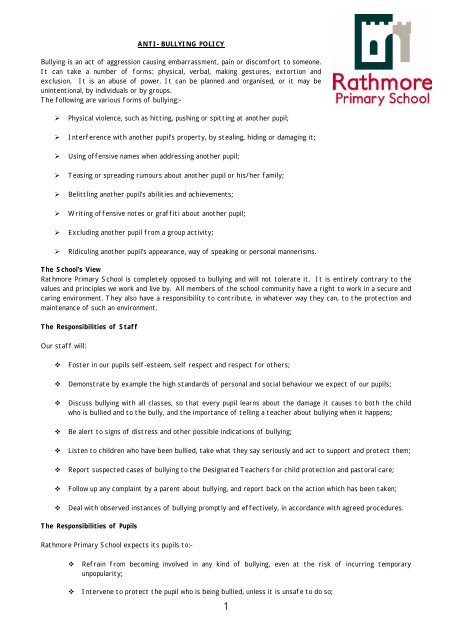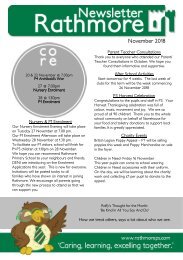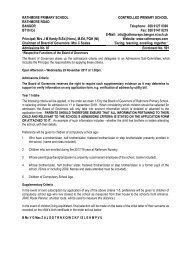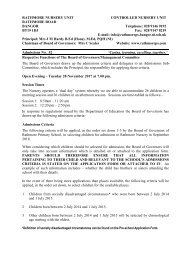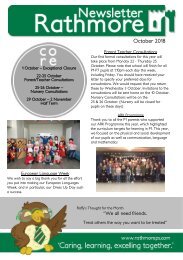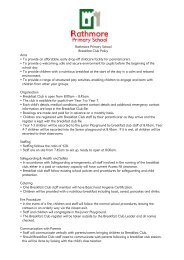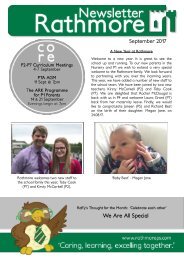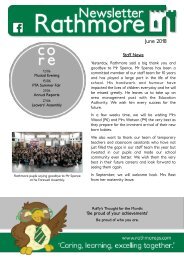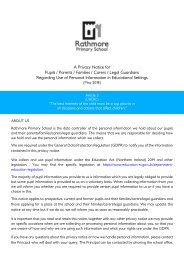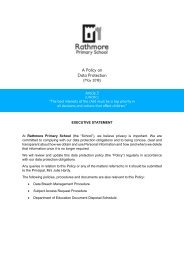SF_anti_bullying_policy
You also want an ePaper? Increase the reach of your titles
YUMPU automatically turns print PDFs into web optimized ePapers that Google loves.
ANTI-BULLYING POLICY<br />
Bullying is an act of aggression causing embarrassment, pain or discomfort to someone.<br />
It can take a number of forms: physical, verbal, making gestures, extortion and<br />
exclusion. It is an abuse of power. It can be planned and organised, or it may be<br />
unintentional, by individuals or by groups.<br />
The following are various forms of <strong>bullying</strong>:-<br />
‣ Physical violence, such as hitting, pushing or spitting at another pupil;<br />
‣ Interference with another pupil’s property, by stealing, hiding or damaging it;<br />
‣ Using offensive names when addressing another pupil;<br />
‣ Teasing or spreading rumours about another pupil or his/her family;<br />
‣ Belittling another pupil’s abilities and achievements;<br />
‣ Writing offensive notes or graffiti about another pupil;<br />
‣ Excluding another pupil from a group activity;<br />
‣ Ridiculing another pupil’s appearance, way of speaking or personal mannerisms.<br />
The School’s View<br />
Rathmore Primary School is completely opposed to <strong>bullying</strong> and will not tolerate it. It is entirely contrary to the<br />
values and principles we work and live by. All members of the school community have a right to work in a secure and<br />
caring environment. They also have a responsibility to contribute, in whatever way they can, to the protection and<br />
maintenance of such an environment.<br />
The Responsibilities of Staff<br />
Our staff will:<br />
<br />
<br />
<br />
<br />
<br />
<br />
<br />
<br />
Foster in our pupils self-esteem, self respect and respect for others;<br />
Demonstrate by example the high standards of personal and social behaviour we expect of our pupils;<br />
Discuss <strong>bullying</strong> with all classes, so that every pupil learns about the damage it causes to both the child<br />
who is bullied and to the bully, and the importance of telling a teacher about <strong>bullying</strong> when it happens;<br />
Be alert to signs of distress and other possible indications of <strong>bullying</strong>;<br />
Listen to children who have been bullied, take what they say seriously and act to support and protect them;<br />
Report suspected cases of <strong>bullying</strong> to the Designated Teachers for child protection and pastoral care;<br />
Follow up any complaint by a parent about <strong>bullying</strong>, and report back on the action which has been taken;<br />
Deal with observed instances of <strong>bullying</strong> promptly and effectively, in accordance with agreed procedures.<br />
The Responsibilities of Pupils<br />
Rathmore Primary School expects its pupils to:-<br />
<br />
<br />
Refrain from becoming involved in any kind of <strong>bullying</strong>, even at the risk of incurring temporary<br />
unpopularity;<br />
Intervene to protect the pupil who is being bullied, unless it is unsafe to do so;<br />
1
Report to a member of staff any witnessed or suspected instances of <strong>bullying</strong>, to dispel any climate of<br />
secrecy and help prevent further instances.<br />
Any who becomes the target of bullies should:-<br />
<br />
Not suffer in silence, but have the courage to speak out, to put an end to their own suffering and<br />
that of other potential pupils.<br />
Cyber Bullying<br />
With developing e – technologies, staff are aware that <strong>bullying</strong> can also be carried out through cyberspace.<br />
Children should be encouraged to tell someone if they are being bullied in this way. A lot of guidance is given in<br />
school during ICT lessons when the children are taught about internet safety. They are also advised that Facebook<br />
and other web sites do have a minimum legal age limit.<br />
The Responsibilities of Parents<br />
Rathmore Primary School asks our parents to support their children and the School by:-<br />
<br />
<br />
<br />
<br />
<br />
<br />
<br />
<br />
<br />
Watching for signs of distress or unusual behaviour in their children, which might be evidence of <strong>bullying</strong>:<br />
A pattern of physical illness e.g. stomach aches, headaches;<br />
Anxiety about travelling to and from school: w<strong>anti</strong>ng to be taken to and collected from school;<br />
Changes in temperament and/or behaviour;<br />
Signs of distress or anxiety – difficulty in sleeping, not eating, inexplicable crying, bed-wetting,<br />
nightmares, stammering, becoming introverted;<br />
Possessions and/or clothing damaged or missing;<br />
Increased requests for and/or stealing money;<br />
Unexplained bruising or cuts;<br />
Deterioration in educational performances or loss of enthusiasm and interest in school;<br />
Reluctance and/or refusal to say what is troubling him/her.<br />
Individually these signs and symptoms do not necessarily mean that a pupil is being bullied. However, if there is a<br />
combination or repetitive occurrence of these, then further investigation is needed in order to determine what is<br />
affecting the pupil.<br />
Advising their children to report to their class teacher or Designated Teachers for Child<br />
Protection and Pastoral Care, and explain the implications of allowing the <strong>bullying</strong> to continue<br />
unchecked, for themselves and for other pupils;<br />
<br />
<br />
<br />
<br />
<br />
Advising their children not to retaliate violently to any form of <strong>bullying</strong>;<br />
Being sympathetic and supportive towards their children, and reassuring them that appropriate<br />
action will be taken;<br />
Keep a written record of any reported instances of <strong>bullying</strong>;<br />
Informing the School of any suspected <strong>bullying</strong>, even if their children are not involved;<br />
Co-operating with the School, if their children are accused of <strong>bullying</strong>, try to ascertain the truth,<br />
and point out the implications of <strong>bullying</strong>, both for the children who are bullied and for the bullies<br />
themselves.<br />
The Responsibilities of All<br />
Everyone should:-<br />
Work together to combat and, hopefully in time, to eradicate any <strong>bullying</strong> tendencies.<br />
This <strong>policy</strong> is kept under review by the Board of Governors.<br />
2


